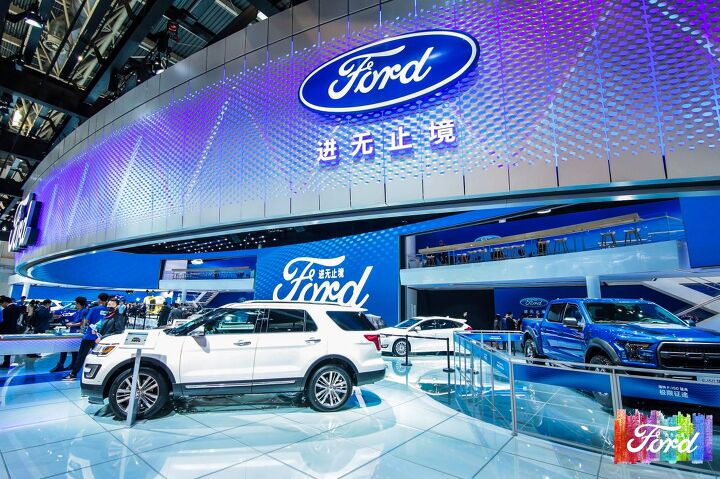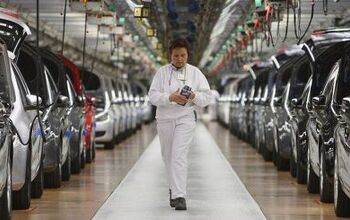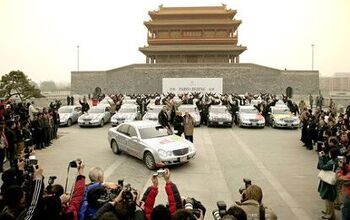World's Largest Car Market Continues Tanking

After rising steadily for almost three decades, China’s end of the economic seesaw seemed to hit its maximum elevation early last year, thus kicking off a swift plunge. For foreign automakers hoping to cash in on a burgeoning middle class hungry for cars, lofty dreams were pared back.
New vehicle sales in the world’s most populous country fell for the first time in 28 years in 2018, and the first two months of 2019 show no change in the market’s downward trajectory.
According to the China Association of Automobile Manufacturers (CAAM), buyers picked up 1.48 million vehicles in February — a 13.8 percent year-over-year decline, Reuters reports. That’s on the heels of a 16-percent decline in January, making February the eighth consecutive month of declining sales.
Economic factors turned cloudy last year, with the country ending 2018 with auto sales down 5.8 percent. This, from a market once viewed as nearly unstoppable.
While sales of “new energy vehicles” (electrics, plug-in hybrids) rose 53.6 percent last month, fuelled by a continued incentivization push from the country’s government, most of the automakers selling these vehicles are domestic.
“The trend experienced last year has continued into this year, and the economic situation has also been weak. This has dragged down consumption,” CAAM’s Deputy Secretary General Shi Jianhua told reporters in Beijing. “Consumers are also waiting for more government policies.”
The country’s leadership plans a number of measures to stimulate both the economy and car buying. First, there’s billions of dollars worth of infrastructure projects and tax cuts in the works. In rural areas, further measures are planned to encourage vehicle ownership, especially that of new energy cars.
Ford saw its fortunes take a hit in China last year, with its sales in that country falling 37 percent. General Motors didn’t fare quite as badly, recording a sales drop of 10 percent.
[Image: Ford China]

More by Steph Willems
Latest Car Reviews
Read moreLatest Product Reviews
Read moreRecent Comments
- Theflyersfan I always thought this gen XC90 could be compared to Mercedes' first-gen M-class. Everyone in every suburban family in every moderate-upper-class neighborhood got one and they were both a dumpster fire of quality. It's looking like Volvo finally worked out the quality issues, but that was a bad launch. And now I shall sound like every car site commenter over the last 25 years and say that Volvo all but killed their excellent line of wagons and replaced them with unreliable, overweight wagons on stilts just so some "I'll be famous on TikTok someday" mom won't be seen in a wagon or minivan dropping the rug rats off at school.
- Theflyersfan For the stop-and-go slog when sitting on something like The 405 or The Capital Beltway, sure. It's slow and there's time to react if something goes wrong. 85 mph in Texas with lane restriping and construction coming up? Not a chance. Radar cruise control is already glitchy enough with uneven distances, lane keeping assist is so hyperactive that it's turned off, and auto-braking's sole purpose is to launch loose objects in the car forward. Put them together and what could go wrong???
- Jalop1991 This is easy. The CX-5 is gawdawful uncomfortable.
- Aaron This is literally my junkyard for my 2001 Chevy Tracker, 1998 Volvo S70, and 2002 Toyota Camry. Glad you could visit!
- Lou_BC Let me see. Humans are fallible. They can be very greedy. Politicians sell to the highest bidder. What could go wrong?


































Comments
Join the conversation
Uber?
China's downturn has been coming for few years now, its been building up since the GFC. 18 million vehicles a year is still good, the bad is the overcapacity for vehicle production. This has been a trait in many Chinese industries, even realestate and construction. Sooner or later this over capacity will catch up and we will hopefully see to poorer investments go under rather than be propped up. The Chinese vehicle industry has many manufacturers and will need to rationalise them, eg, under performing manufacturers bought out by larger more profitable manufacturers. The Chinese are in the midst of a transitioning economy and maybe Trump's attempt at isolating the Chinese will accelerate the transition into a service based and modernised economy. This will make them richer and more powerful. We (OECD) might have been better off leaving the Chine as cheapass factory workers. The Chinese will adapt and hopefully as the people in China gain affluence the freedom for them will materialise. Or, as I reckon, China will have a civil war, between the capitalists (private sector) and Central Committee. The Provinces in China are in some cases almost autonomous and not as staunch at following the Central Committee as most think. China is communist, but Chinese society is capitalist. That's what we in the West need to target.